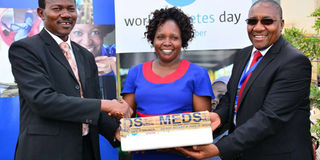Public-private partnership gives lifeline to diabetes patients

Jane Muthoni receives a one-year supply of insulin drugs from MEDS Managing Director Paschal Manyuru and head of customer care Dr Jonathan Kiliko. PHOTO| FILE| NATION MEDIA GROUP
Living with a health condition that constantly threatens your life for more than 36 years is no walk in the park. For Jane Muthoni, 44, tonsillitis at the age of eight was just another normal childhood ailment.
She never imagined it could be an early sign of a condition she would live with for the rest of her life. Things got worse when she got arthritis, followed by an unusually frequent short calls. Tests showed glucose in her urine and a full prognosis confirmed she had diabetes, joining the growing number of people living with diabetes in Kenya.
PRIVATE-PUBLIC COLLABORATION CREATES SOLUTION
Muthoni never fully understood what living with diabetes meant until she was mature enough to understand the cost implications. However, she is now getting much-needed relief from a public-private partnership that seeks to ease the burden for diabetes patients by giving them affordable insulin to manage their blood sugar.
The Base of the Pyramid (BoP) project is an initiative of Novo Nordisk, a manufacturer of insulin, and it aims to increase access to comprehensive diabetes care and insulin among patients with low income in developing countries. It is currently running in Ghana, Kenya, Nigeria and India.
In Kenya, the partnership between Novo Nordisk, the Ministry of Health, the Royal Danish Embassy, Phillips Pharmaceuticals Ltd and Mission for Essential Drugs and Supplies (MEDS) has helped to lower the price of insulin by more than 70 per cent, from a high of Sh2,000 to just Sh500.
MEDS procures, stores and distributes insulin to faith-based and public health facilities across Kenya. The organisation set up two walk-in cold rooms to enhance the capacity to store insulin and other controlled cool temperature therapies, which ensures consistent supply to patients.
This initiative supports 366,247 diabetes patients who now get uninterrupted supply of insulin. MEDS has been supplying insulin to 27 counties in Kenya for the last five years under the BoP programme which was launched in 2012.
“MEDS supports health facilities by making sure that insulin is available and at affordable prices to patients with low to middle income,” says Mr Paschal Manyuru, MEDS managing director.
While Muthoni has been lucky to live with the condition for long, many struggle with diabetes due to lack of drugs or managing its special lifestyle.
Muthoni went through primary and high school with the condition and went on to study accounting. She got married in 1997 and has children. In 2011, she gave birth to her second born through Caesarian Section (CS), spending just two days in hospital. This depicts an improved lifestyle with well-controlled sugar levels.
Muthoni is now a full-time diabetes peer educator at Kenya Defeat Diabetes Association. She doesn’t want to be treated as sick. She believes it is not a disease but a condition that can be managed through healthy lifestyle habits.
“So many people are suffering but they are not aware. Others are aware but do not have relevant information,” she says.


